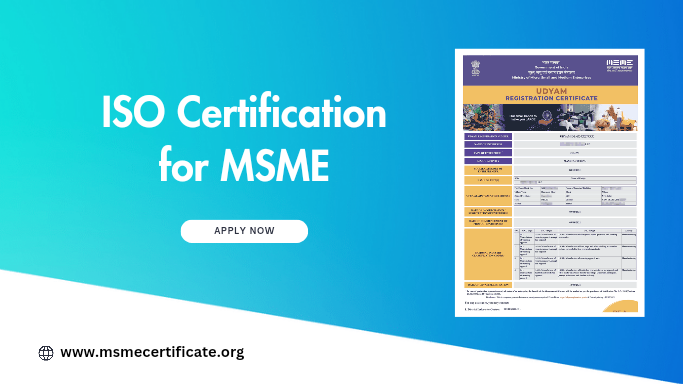ISO Certification for MSMEs: A Comprehensive Guide
Are you a Micro, Small, or Medium Enterprise (MSME) seeking ISO certification? This guide is tailored just for you. Here’s everything you need to know about ISO certification for MSMEs, from its benefits to the certification process, and FAQs to address your queries.

Introduction to ISO Certification for MSMEs
In today’s competitive market, quality management is crucial for the success and sustainability of any business, regardless of its size. ISO certification serves as a testament to a company’s commitment to quality and customer satisfaction. For MSMEs, obtaining ISO certification can open up new opportunities, enhance credibility, and improve efficiency.
Benefits of ISO Certification for MSMEs
- Enhanced Credibility: ISO certification enhances the credibility of an MSME by demonstrating its compliance with international quality standards.
- Access to Global Markets: ISO certification facilitates access to global markets by assuring international clients of the quality and reliability of MSME products or services.
- Improved Efficiency: Implementing ISO standards helps streamline processes, reduce errors, and improve overall efficiency within the MSME.
- Customer Satisfaction: ISO certification signifies a commitment to meeting customer requirements and enhancing satisfaction, thereby increasing customer loyalty.
- Competitive Advantage: ISO-certified MSMEs gain a competitive edge over non-certified competitors, especially when bidding for contracts or tenders.
- Legal Compliance: ISO certification ensures compliance with statutory and regulatory requirements, mitigating legal risks for MSMEs.
- Continuous Improvement: ISO standards encourage a culture of continuous improvement within the MSME, leading to better products, services, and processes.
- Supplier Relationships: ISO certification may be a prerequisite for partnering with larger companies or government organizations, strengthening supplier relationships.
- Risk Management: ISO standards incorporate risk management principles, helping MSMEs identify, assess, and mitigate risks effectively.
- Employee Morale: ISO certification fosters a sense of pride and accountability among employees, leading to higher morale and engagement.
ISO Certification Process for MSMEs
- Determine Applicable Standards: Identify the ISO standards relevant to your industry and business objectives.
- Gap Analysis: Assess your current processes and systems to identify gaps against ISO requirements.
- Plan Implementation: Develop a comprehensive plan to implement necessary changes and improvements.
- Documentation: Prepare documentation, including quality manuals, procedures, and work instructions, as per ISO standards.
- Training: Train employees on ISO requirements, processes, and their roles in maintaining quality standards.
- Implementation: Implement changes across the organization, ensuring adherence to ISO standards at every stage.
- Internal Audit: Conduct internal audits to assess compliance and identify areas for improvement.
- Management Review: Review the effectiveness of the implemented system and make necessary adjustments.
- Certification Audit: Engage a certification body to conduct an independent audit of your quality management system.
- Certification: Upon successful completion of the audit, receive ISO certification, which is typically valid for three years, subject to surveillance audits.
FAQs on ISO Certification for MSMEs
- What is ISO Certification? ISO certification is a formal attestation that a company complies with specific international standards for quality management, environmental management, information security, etc.
- Why is ISO Certification Important for MSMEs? ISO certification enhances credibility, improves efficiency, facilitates market access, and ensures compliance with regulatory requirements.
- Which ISO Standards are Relevant for MSMEs? ISO 9001 (Quality Management System), ISO 14001 (Environmental Management System), ISO 27001 (Information Security Management System), and ISO 45001 (Occupational Health and Safety Management System) are commonly applicable to MSMEs.
- How Long Does it Take to Obtain ISO Certification? The duration varies depending on factors such as the size of the organization, complexity of processes, and readiness for certification. On average, it takes three to six months.
- What are the Costs Involved in ISO Certification? Costs include consultancy fees, training expenses, documentation costs, certification audit fees, and surveillance audit fees.
- Is ISO Certification Mandatory for MSMEs? ISO certification is not mandatory, but it offers numerous benefits in terms of quality management, market credibility, and customer satisfaction.
- Can MSMEs Get Financial Assistance for ISO Certification? Some government schemes and financial institutions offer subsidies or reimbursements for ISO certification expenses incurred by MSMEs.
- How Often is ISO Certification Renewed? ISO certification is typically valid for three years and requires renewal through surveillance audits conducted annually or biennially.
- Can MSMEs Achieve ISO Certification Without External Assistance? While it’s possible for MSMEs to achieve ISO certification independently, many opt for external consultancy services to streamline the process and ensure compliance.
- What Happens if an MSME Fails to Meet ISO Standards During Certification? If non-conformities are identified during the certification audit, the MSME must address them within a specified timeframe to achieve certification.
Conclusion
ISO certification is a valuable asset for MSMEs looking to enhance their credibility, improve operational efficiency, and gain a competitive edge in the market. By understanding the certification process, leveraging available resources, and committing to quality management principles, MSMEs can successfully obtain and maintain ISO certification, unlocking numerous benefits along the way.

